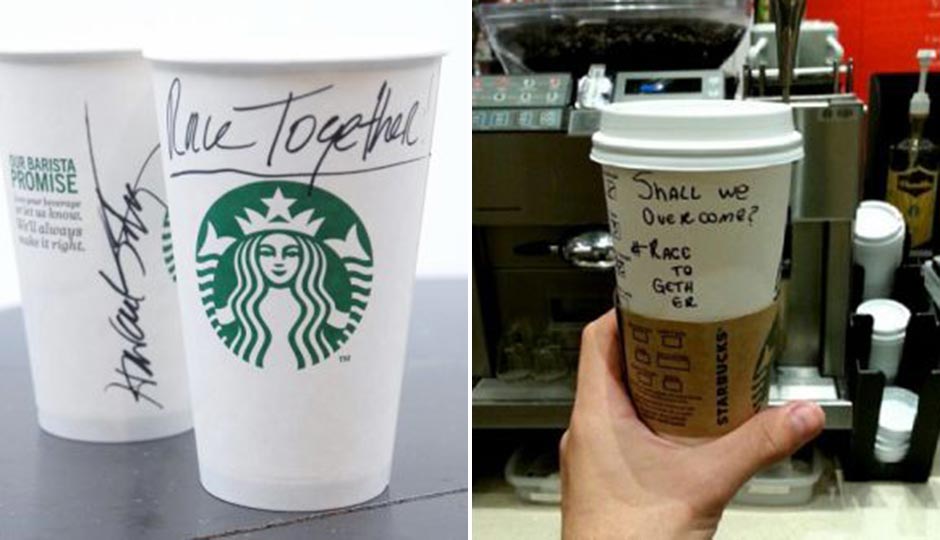Why Starbucks’ #RaceTogether Campaign Flopped

Photos | Starbucks.com
Last week, in a fantastic advertising campaign disguised as a social initiative, Starbucks launched #RaceTogether, encouraging employees at 12,000 U.S. locations to write “Race Together” on coffee cups. This week, the message intended to start a conversation about race has ended. According to CEO Howard Schultz, the phasing out of the phrase is not a failure, but just the opening salvo in a year-long “Race Together” program that will continue, including forum discussions and special sections in USA Today.
I wanted to pinch Starbucks on its metaphorical cheek. Bless it’s little heart … it tried. In tackling race in America, Starbucks was defeated, in part, by its own business model as a “third place,” an “affordable luxury” where one can escape the cares of the world. From the pushback, it appears customers, social media observers, company shareholders and even Starbuck baristas were not up for race conversations over coffee.
So virulent were the critics that even the head of Starbucks’ global PR temporarily suspended his Twitter account for 24 hours. “Last night I felt personally attacked in a cascade of negativity,” explained Corey duBrowa in a blog post last week. “I got overwhelmed by the volume and tenor of the discussion, and I reacted. Most of all, I was concerned about becoming a distraction from the respectful conversation around Race Together that we have been trying to create.” I’m not sure, but for the PR head to disable his Twitter account at the beginning of what proved to be a publicity disaster is akin to a captain jumping ship before the passengers, leaving the overworked baristas to bail water.
Heck, I’m peeved the one-sided dialogue has ended and I’d barely taken a second sip of my Venti decaf Macchiato (with skim soy milk, extra caramel syrup and no whipped cream) because I was busy pondering the somewhat-ambiguous message about race relations scrawled near my (misspelled) name. Was Starbucks really ready to tackle the hot-button issue of America’s race problem? While we are 50 years past the trio of events known as the Selma March — the first one sparked a one-sided violent attack by police on the peaceful marchers that deeply rattled Martin Luther King, who called Bloody Sunday “the greatest confrontation so far in the South” — America’s stance on race is still polarized.
A spin through the comments section of any major news story involving anyone of color is all the proof you need that much of America is not interested or equipped for a casual conversation about race — especially not before they’ve had their morning cuppa.
I applaud Starbucks’ attempt, but writing #RaceTogether on beverage cups was, at best, an awkward and wildly ignorant approach to the explosive issue of race in America. When I first heard of this ill-fated effort, I went to the Starbucks Media Page for background and found images that displayed only white (looking) hands holding #RaceTogether cups. Sure, Starbucks has rallied to keep guns out of its shops and have supported veterans and same-sex marriage, but has also been criticized for it’s own lack of diversity. As a counter, the company released data on its diversity last week, claiming that 42 percent of its vice presidents are women, and 16 percent are ethnic minorities.
In days, the world’s biggest coffee chain became the world’s biggest joke. Schultz stuck his toe in the water of race relations, and found out that not only is it cold, it’s deep, too. Under the guise of good intentions, Starbucks wants to talk about race, and I say, “No thanks.” You see, I really don’t have time to point out the lunacy of your incredible privileged stance as a barista feigns interest in my opinion on America’s racial psychosis while waiting for my next coffee creation.
Just look back to last week, Starbucks, and ponder when your company bought newspapers ads reading “Shall We Overcome?” — an obvious reference to the famed Civil Rights anthem that ends with what is the most important word of the song: “Someday.” Despite the notion of “post-racial” America, the matter of race will continue to vex this country for generations to come.
In the meantime, Starbucks, change my order: Make it black.
Follow @BobbiBooker on Twitter.


